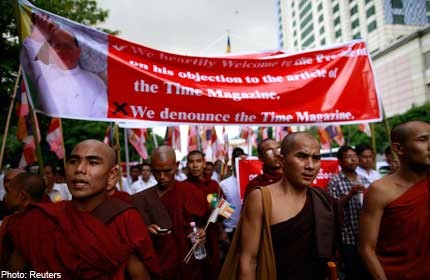Myanmar Buddhist committee bans anti-Muslim organisations

YANGON - A government-appointed body that oversees Myanmar's Buddhist monkhood has issued a directive intended to check the influence of a monk-led movement accused of stoking violence against minority Muslims.
At least 237 people have died in sectarian violence since June last year and more than 150,000 have been displaced. The vast majority of the victims were Muslim.
The bloodshed, mirrored by increasing attacks on Muslims in Buddhist-majority Sri Lanka, has threatened to undermine political and economic reforms the government initiated two years ago after half a century of military rule.
In an order dated Sept. 2, the State Sangha Maha Nayaka Committee of monks responsible for regulating the Buddhist clergy prohibited the creation of formal organisations based around the 969 movement.
"They didn't receive any permission, yet they want to form an organisation and make nationality-protection laws," Ashin Baddanda Guna Linkara, the committee's vice-chairman for Yangon, told Reuters.
The committee did not object to monks promoting the 969 ideology, which urges Buddhists to protect their faith against a perceived threat from Islam, he said, but the movement's leaders had gone too far by drafting proposed laws, including one that would stop Buddhist women marrying outside their religion.
The numerals 969, which refer to the attributes of the Buddha, his teachings and the monkhood, have come to symbolise a movement aimed at isolating Muslims, who make up 5 per cent of Myanmar's 60 million people.
Monks who lead the movement make speeches urging Buddhists to boycott Muslim-owned businesses, the message spread through CDs and DVDs sold widely in shops and on street stalls. Stickers bearing the movement's logo are plastered on businesses across the country, letting customers know they are Buddhist-owned.
The movement's leaders say they do not condone violence against Muslims but its rise has accompanied the communal unrest since last year.
In a Sept. 10 statement, the movement's most visible leader, a monk named Wirathu, said he was "heartbroken" by the violence and pledged to help make peace between the communities. He has previously called mosques "enemy bases" and urged Buddhists to boycott Muslim businesses and shun interfaith marriage.
Speaking to reporters after signing the statement, he rejected the State Sangha Maha Nayaka Committee's ban on formal 969 organisations, calling the body undemocratic.
"Every procedure and rule in the Sangha Nayaka was written while under the gun," he said, pointing out the committee was formed under the former military regime.
It was created in 1980 as a way of controlling the monkhood, which has great influence over Myanmar's Buddhists, who make up most of the population.
The committee and its senior monks remain tarnished by their close links to the dictatorship, which ended in 2011 when a quasi-civilian government took office.
In Sept. 2007 the committee issued a directive prohibiting monks from participating in "secular affairs", a clear message to the thousands of monks leading the "Saffron Revolution"pro-democracy protests across Myanmar at the time. The directive was largely ignored.
Some monks have taken part in clashes between Muslims and Buddhists over the past year. But Ye Htut, a spokesman for President Thein Sein, has told Reuters that only a handful of Myanmar's 500,000 monks hold extremist ideas and pointed out that monks helped save the lives of Muslims during the clashes.